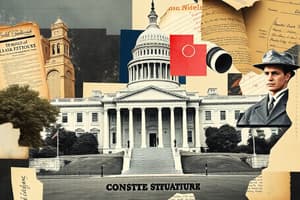Podcast
Questions and Answers
Constitutional law exclusively refers to the relationships among the organs of state.
Constitutional law exclusively refers to the relationships among the organs of state.
False (B)
A constitution, in its narrow sense, is defined as a document that outlines the framework of state functions.
A constitution, in its narrow sense, is defined as a document that outlines the framework of state functions.
True (A)
Tom Pain argued that a government can exist without a constitution.
Tom Pain argued that a government can exist without a constitution.
False (B)
In almost all democracies, a written constitution is the only source of constitutional rules.
In almost all democracies, a written constitution is the only source of constitutional rules.
The concept of a constitution involves both the legal and political framework of government.
The concept of a constitution involves both the legal and political framework of government.
The ultimate authority of a constitution comes from the governing body rather than the people.
The ultimate authority of a constitution comes from the governing body rather than the people.
Constitutional law is primarily concerned with individual liberties and democratic institutions.
Constitutional law is primarily concerned with individual liberties and democratic institutions.
A constitution is considered 'supreme' because it is derived from the political process.
A constitution is considered 'supreme' because it is derived from the political process.
Which statement best describes the relationship between constitutional law and individual freedoms?
Which statement best describes the relationship between constitutional law and individual freedoms?
How does the concept of a constitution include the historical context of its creation?
How does the concept of a constitution include the historical context of its creation?
What is the broader understanding of a constitution according to the content provided?
What is the broader understanding of a constitution according to the content provided?
What role does the political process play in the formation of a constitution?
What role does the political process play in the formation of a constitution?
Which of the following statements about the sources of constitutional rules is accurate?
Which of the following statements about the sources of constitutional rules is accurate?
According to Tom Pain, how is a constitution related to the government?
According to Tom Pain, how is a constitution related to the government?
What does the term ‘supreme’ signify in relation to a constitution?
What does the term ‘supreme’ signify in relation to a constitution?
What aspect does constitutional law emphasize in a stable democracy?
What aspect does constitutional law emphasize in a stable democracy?
Flashcards
Constitutional Law
Constitutional Law
Legal rules and principles about how state power is distributed and used, including relationships between state organs and individuals.
Constitution (narrow sense)
Constitution (narrow sense)
A formal document outlining the structure and functions of state organs and their relationships.
Constitution (wide sense)
Constitution (wide sense)
All the legal and political rules governing a nation's government, including the rules that establish and control government.
Constitutional Order
Constitutional Order
Signup and view all the flashcards
Political Process
Political Process
Signup and view all the flashcards
Supreme Constitution
Supreme Constitution
Signup and view all the flashcards
Relationship between Individuals & State
Relationship between Individuals & State
Signup and view all the flashcards
Structure and Power of the State
Structure and Power of the State
Signup and view all the flashcards
Constitutional Law
Constitutional Law
Signup and view all the flashcards
Constitution (wide sense)
Constitution (wide sense)
Signup and view all the flashcards
Constitutional Order
Constitutional Order
Signup and view all the flashcards
Political Process
Political Process
Signup and view all the flashcards
Relationship Ind-State
Relationship Ind-State
Signup and view all the flashcards
Structure & Power
Structure & Power
Signup and view all the flashcards
"Supreme" Constitution
"Supreme" Constitution
Signup and view all the flashcards
Constitution (narrow sense)
Constitution (narrow sense)
Signup and view all the flashcards
Study Notes
Focus of Constitutional Law
- Constitutional law concentrates on the power distribution and interactions between government branches.
Narrow Definition of a Constitution
- A constitution, in its narrowest sense, acts as a blueprint for state functions, outlining its framework.
Tom Paine's View
- Tom Paine argued that a government's existence doesn't necessitate a formal constitution.
Written Constitutions in Democracies
- In most democracies, written constitutions serve as the primary source of constitutional rules.
Broader Scope of a Constitution
- The concept of a constitution extends beyond legal frameworks, encompassing the political landscape and government structures.
Source of Constitutional Authority
- The ultimate authority of a constitution stems from the governing body, not directly from the people.
Relationship between Constitutional Law and Individual Liberties
- Constitutional law plays a crucial role in safeguarding individual freedoms and ensuring democratic institutions function effectively.
Constitution's Historical Context
- The historical context surrounding a constitution's creation influences its content and interpretation.
Supreme Nature of a Constitution
- A constitution is deemed "supreme" because it originates from the political process, making it the foundation for all other laws.
Role of the Political Process in Constitution Formation
- The formation of a constitution involves a complex political process, reflecting societal values and power dynamics at the time.
Sources of Constitutional Rules
- Written constitutions are primarily used to establish constitutional rules in democratic systems.
Constitution's Relationship to Government (Tom Paine)
- According to Tom Paine, a government can operate without a formal constitution, suggesting a government's existence is independent from a written document.
Supreme Significance of a Constitution
- The term "supreme" emphasizes a constitution's paramount authority, signifying that it stands above all other laws and dictates their legitimacy.
Constitutional Law's Emphasis in Stable Democracies
- In stable democracies, constitutional law focuses on upholding individual liberties and ensuring the smooth functioning of democratic institutions.
Studying That Suits You
Use AI to generate personalized quizzes and flashcards to suit your learning preferences.




